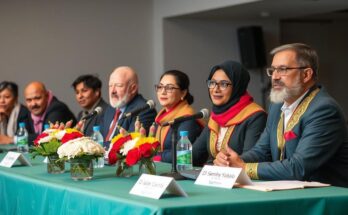The DRC has filed criminal charges against Apple’s subsidiaries, alleging they sourced conflict minerals from sub-Saharan Africa, misleading consumers regarding ethical practices. The ongoing violence in the region has led to significant human rights abuses among local miners. This legal action aims to enforce accountability in corporate supply chains amidst rising global scrutiny.
The Democratic Republic of the Congo (DRC) has lodged criminal charges against Apple’s subsidiaries in France and Belgium, alleging that the company has sourced “conflict minerals” from sub-Saharan Africa. These allegations stem from claims made by DRC representatives asserting that Apple is engaged in deceptive commercial practices that mislead consumers about the ethical sourcing of its minerals. The ongoing conflict in the DRC has made it a key supplier of minerals such as tantalum, tin, tungsten, and gold, which are commonly used in electronics and industries worldwide.
Conflict minerals are those sourced from regions marred by conflict, particularly in the DRC where the local population has faced severe exploitation from armed groups vying for control of these resource-rich areas. Human rights organizations have repeatedly cited hazardous working conditions, including forced labor and human trafficking, prevalent in these mining operations. In their investigation, DRC representatives traced Apple’s supply chain and alleged it could be tainted with minerals obtained through violent and illegal means.
According to reports from the United States Government Accountability Office, the eastern DRC is rich in these minerals, often referred to as the 3TGs (tin, tantalum, tungsten, and gold). The ongoing conflicts, driven by over two decades of violence, have allegedly caused profits from mineral sales to fund armed groups, prolonging the turmoil. The Rwandan-backed group M23 has been specifically noted for its control over coltan production in the region, which fuels the global supply chain for electronic components.
The DRC’s legal action against Apple initiated after President Félix Tshisekedi ordered an investigation into the illegal exportation of these conflict minerals sourced from Congolese territory. Despite Apple’s assertions that they have excised conflict minerals from their supply chain, DRC’s legal representatives are pursuing accountability, noting a lack of response from Apple prior to the filing of these criminal complaints.
The case aims to highlight the ethical dilemmas surrounding international supply chains and is being prosecuted in Europe to leverage existing regulations within the European Union aimed at responsible sourcing and the eradication of conflict financing. As pressure mounts on tech giants to ensure ethical supply chains, the DRC aims not only for legal accountability but also to foster change in how global corporations navigate mineral sourcing in conflict-affected regions, thus seeking to eliminate human rights abuses linked to such practices.
This case unfolds against the backdrop of the DRC’s longstanding struggles with armed conflict and the exploitation of its rich mineral resources. The DRC is recognized for its reserves of tantalum, tin, tungsten, and gold, commonly known as conflict minerals, which have become central to international supply chains yet have been implicated in financing armed violence. The allegations against Apple highlight the broader issue of corporate responsibility and the ethical implications of sourcing minerals from conflict zones, particularly in regions where armed groups exert substantial control over mining operations and labor practices. The DRC’s endeavor to prosecute Apple underscores a growing global movement to hold corporations accountable for their sourcing practices and to advocate for ethical supply chain management practices.
In summary, the Democratic Republic of the Congo’s criminal charges against Apple illuminate critical concerns regarding the use of conflict minerals in global supply chains. The charges reflect a broader imperative for corporations to take responsibility for their sourcing practices, particularly in regions marred by violence and exploitation. As this legal case progresses in Europe, it is positioned within a context of heightened scrutiny and regulatory action aimed at mitigating the ethical implications associated with conflict minerals, thus promoting accountability within the tech industry and beyond.
Original Source: www.aljazeera.com




